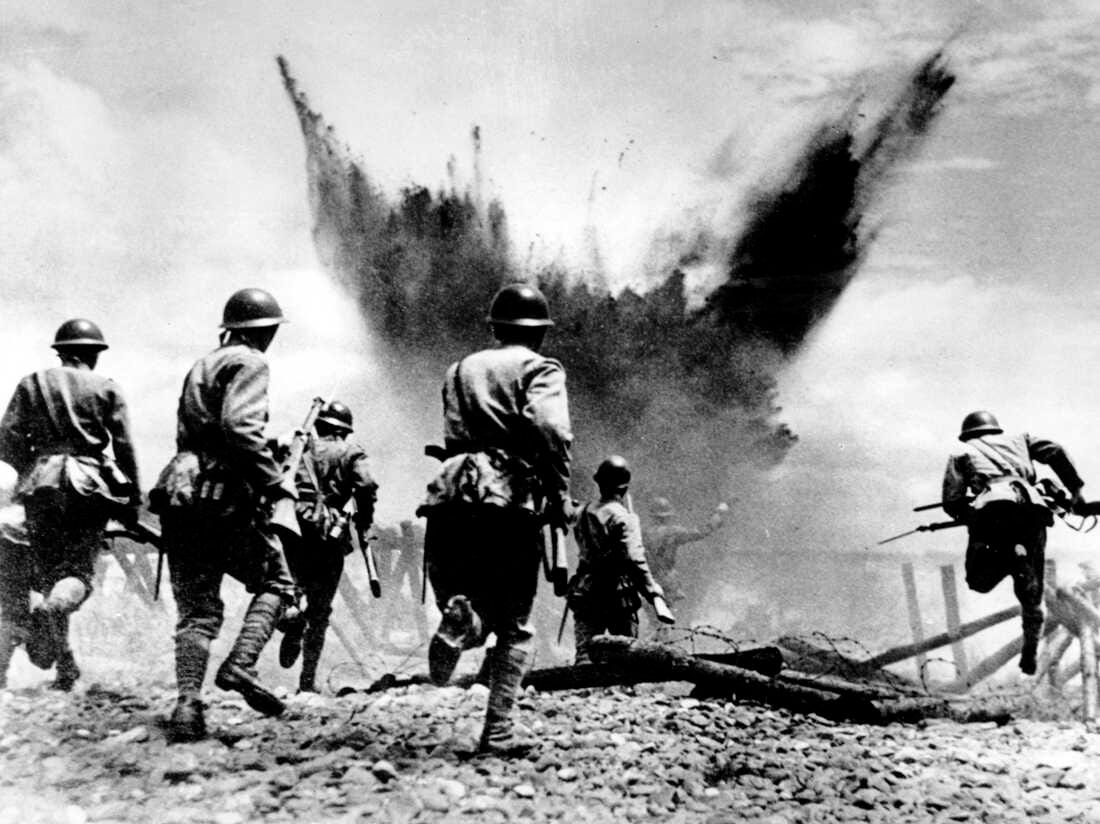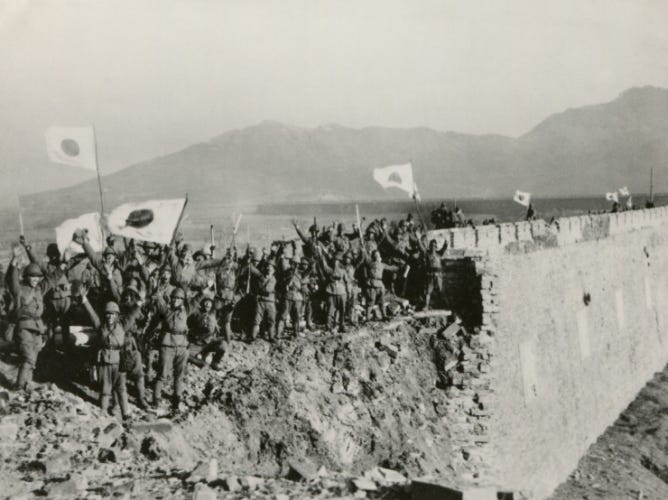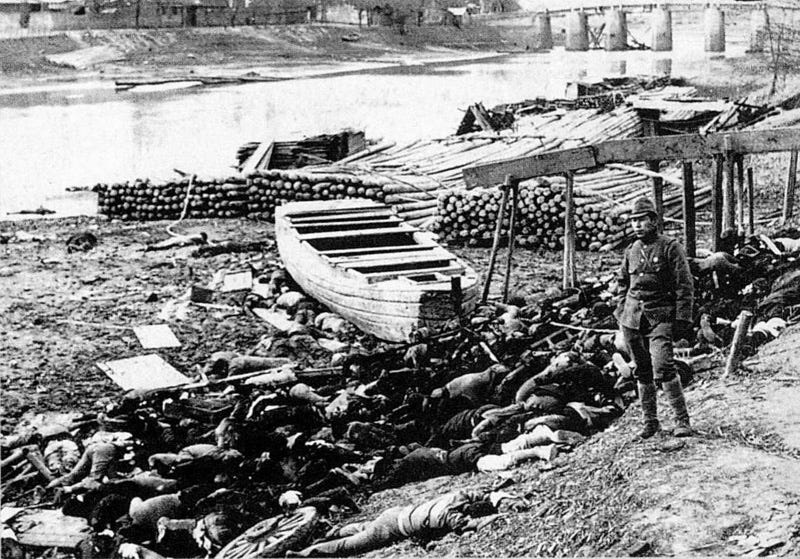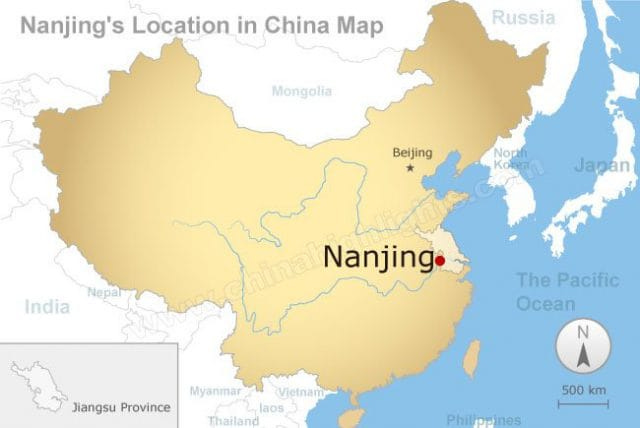December 13 - Nanjing Nightmare: The Vicious Japanese Invasion of China
Finding Strength to Shelter Others Despite Our Brokenness
This is the day Japanese forces captured Nanjing, China, beginning one of history's darkest chapters known as the Nanjing Massacre in 1937.
In today's lesson, we will discover how ordinary people created an extraordinary sanctuary in the midst of one of history's darkest moments. What makes an imperfect refuge perfect for God's purposes? How can our broken places become channels of divine comfort for others?
"Praise be to the God and Father of our Lord Jesus Christ, the Father of compassion and the God of all comfort, who comforts us in all our troubles, so that we can comfort those in any trouble with the comfort we ourselves receive from God." - 2 Corinthians 1:3-4 (NIV)
This Date in History
The cold December air was thick with fear as civilians crowded the streets of Nanjing on December 13, 1937. The deep, resonant boom of artillery fire mixed with the terrified cries of families seeking safety, while black smoke from burning buildings turned the horizon to ash. Japanese forces had breached the ancient city walls, and an ominous sense of doom hung over China's capital. Thousands of residents frantically pushed towards the Nanjing Safety Zone, a supposed sanctuary established by Western missionaries and businessmen—an act of desperate hope against an encroaching nightmare. Little did they know, the real horror was only beginning, an inferno of violence that would scar the city for years to come.
The fall of Nanjing marked the grim conclusion of Japan's Shanghai-Nanjing campaign during the Second Sino-Japanese War. Following the capture of Shanghai in November, Japanese forces under General Iwane Matsui pushed forward, unrelenting in their march towards Nanjing. Though Chinese troops fought fiercely under Generalissimo Chiang Kai-shek, their defenses proved no match for the advancing Japanese army. As the enemy drew near, many Chinese officers abandoned their posts, leaving the ill-equipped soldiers to fend for themselves—alone and hopeless against the powerful invasion.
The International Committee for the Nanjing Safety Zone, led by German businessman John Rabe and American missionary John Magee, fought tirelessly to carve out a refuge amid the chaos. Marking a modest 2.5-square-mile area, they hoped—almost against reason—that this fragile zone might shield civilians under international law. It was an act of faith as much as strategy, an effort made by a few determined souls who refused to abandon their humanitarian convictions even as the world outside descended into darkness.
When Japanese troops poured into Nanjing, they unleashed a systematic wave of violence that history now remembers as the Rape of Nanjing. Despite the Committee's tireless efforts, the Safety Zone's boundaries were breached time and time again. Japanese soldiers roamed the streets, dragging away young men and women, ignoring any semblance of international protection. John Rabe—ironically a member of the Nazi Party—became an unexpected advocate for the Chinese people. He kept detailed diaries of the horrors unfolding around him and appealed repeatedly, if futilely, to Japanese authorities to halt the brutality.
The massacre continued for six weeks. Japanese soldiers engaged in killing contests, mass executions, and widespread sexual violence that eventually resulted in thousands of estimated pregnancies. Estimates of the death toll range from 40,000 to over 300,000 people. The remaining population huddled in the Safety Zone, where the small group of Westerners worked tirelessly to protect them, often placing themselves between Japanese soldiers and Chinese civilians. The International Committee documented these atrocities consistently, with missionary George Fitch smuggling out films and photographs, and Minnie Vautrin keeping detailed diaries of her efforts to protect thousands of women and girls at Ginling College.
The aftermath of the massacre left deep psychological scars not only on those who survived but also on those who bore witness to the unspeakable. Minnie Vautrin, once a beacon of hope for countless women, eventually succumbed to the unbearable weight of her memories, ending her own life in 1941. John Rabe, who had risked everything to protect others, returned to a Germany that greeted him with suspicion, poverty, and denazification. Their stories—of courage, sacrifice, and tragic aftermath—remind us that even the greatest acts of humanity often come with an incalculable personal cost. The Nanjing Massacre became a defining moment in Sino-Japanese relations. The Japanese government's subsequent attempts to downplay or deny the atrocities created ongoing diplomatic tensions. Today, the Nanjing Massacre Memorial Hall stands as a somber reminder of the tragedy, while debates about the historical details continue to influence international relations in East Asia.
Historical Context
The Second Sino-Japanese War erupted in 1937 as part of Japan's expansionist ambitions in Asia. Japan had already established a significant presence in China through previous conflicts, including the First Sino-Japanese War of 1894-1895 and its occupation of Manchuria in 1931. The Japanese military doctrine emphasized absolute victory and martial pride, with surrender considered dishonorable—a mindset that would tragically influence their treatment of prisoners and civilians.
China in the 1930s was a nation divided by civil conflict between Chiang Kai-shek's Nationalist government and Mao Zedong's Communist forces. This internal strife weakened China's ability to present a united front against Japanese aggression. The Nationalist government had only recently established Nanjing as its capital, attempting to modernize and strengthen the nation despite ongoing political turbulence and economic challenges.
The international community's response to Japanese aggression was complicated by the growing tensions in Europe. Western powers, particularly Britain and the United States, had significant economic interests in China but were increasingly preoccupied with the rise of Nazi Germany and the looming threat of war in Europe. This divided attention limited their willingness to intervene decisively in Asian conflicts, effectively giving Japan greater freedom to pursue its territorial ambitions.
The presence of Western missionaries and businessmen in Nanjing reflected China's complex relationship with foreign powers. Following the Opium Wars and subsequent "unequal treaties," Western nations had established concessions and settlements throughout China. While this history created resentment among many Chinese, it also led to the establishment of educational institutions, hospitals, and other facilities run by Western missionaries who often formed deep connections with local communities.
Did You Know?
The city's name appears in historical records as both "Nanjing" and "Nanking" - "Nanjing" is the modern Pinyin romanization of the Chinese characters, while "Nanking" was the postal romanization used during the historical period and appears in many Western accounts and book titles from that era.
Today’s Reflection
The Nanjing Safety Zone seemed an impossibility - a fragile sanctuary within a city under siege. Its very walls had been breached, its borders violated, and its protectors were themselves vulnerable and exposed. Yet within this imperfect refuge, thousands found shelter through the unwavering dedication of those who chose to stay and help despite their own precarious situation.
This profound truth echoes through history and speaks directly to our hearts today - we need not be perfect to provide shelter for others. John Rabe, Minnie Vautrin, and their fellow committee members had no special powers, no impenetrable fortress, and no guarantee of success. They were ordinary people working with limited resources in extraordinary circumstances. Their own safety was constantly at risk, yet they persevered in protecting others.
Like the walls of Nanjing, our lives often bear the marks of struggle and imperfection. We may feel inadequate, damaged, or ill-equipped to offer help to others. The enemy whispers that our own brokenness disqualifies us from being useful in God's kingdom. Yet as 2 Corinthians 12:9 (NIV) reminds us, "My grace is sufficient for you, for my power is made perfect in weakness." It is often through our broken places that God's light shines most brightly.
The Safety Zone Committee members weren't superhuman - they experienced fear, doubt, and trauma alongside those they protected. Their diaries reveal their struggles with inadequacy and helplessness in the face of overwhelming violence. Yet their very vulnerability made them more effective in providing comfort and understanding to those in their care. They embodied the truth of 1 Peter 4:8-9 (NIV): "Above all, love each other deeply, because love covers over a multitude of sins. Offer hospitality to one another without grumbling."
Consider how God uses our wounds to create wells of compassion. When we have experienced grief, we can truly comfort the grieving. When we have known failure, we can authentically encourage those who struggle. When we have felt lost, we can genuinely guide others toward hope. As 2 Corinthians 1:3-4 (NIV) reminds us, God is "the Father of compassion and the God of all comfort, who comforts us in all our troubles, so that we can comfort those in any trouble with the comfort we ourselves receive from God." Our brokenness becomes the very channel through which divine comfort flows to others.
Just as the Safety Zone's effectiveness wasn't diminished by its imperfect boundaries, our ability to serve isn't limited by our imperfections. In fact, Hebrews 4:15-16 (NIV) tells us that Jesus himself "has been tempted in every way, just as we are" so that we might "approach God's throne of grace with confidence." Our wounds and weaknesses don't disqualify us from ministry - they qualify us to minister with authentic empathy and understanding.
The legacy of Nanjing's imperfect sanctuary challenges us to stop waiting for perfect circumstances or complete healing before extending help to others. God doesn't call the equipped; He equips the called. Like those brave souls in Nanjing, we are invited to offer whatever shelter we can, with whatever resources we have, trusting that God's power is indeed made perfect in our weakness.
Practical Application
Take time to identify one area of past pain or current struggle in your life, then consider how that experience might uniquely equip you to help others facing similar challenges. Rather than waiting for complete healing, look for one specific way to use your story this week to provide comfort, understanding, or practical support to someone else who is hurting.
Closing Prayer
Lord, we thank You for the powerful reminder that You work through our weaknesses and imperfections to bring Your grace to others. Just as the courageous souls in Nanjing created refuge amidst their vulnerability, teach us to embrace our struggles as opportunities to reflect Your love and compassion. Help us to see that our brokenness can become a source of healing and comfort for those in need. Give us the courage to offer shelter and support, even when we feel unworthy or unequipped. Remind us that Your strength is made perfect in our weakness and that You equip those You call. May we trust You to work through us, extending Your light and hope to a world in need. In Jesus’ name, Amen.
Supplementary Study
"He gives strength to the weary and increases the power of the weak. Even youths grow tired and weary, and young men stumble and fall; but those who hope in the Lord will renew their strength."
This passage reminds us that God specifically empowers the weak and weary, suggesting that our times of weakness can become opportunities for experiencing and sharing His strength.
"But we have this treasure in jars of clay to show that this all-surpassing power is from God and not from us. We are hard pressed on every side, but not crushed; perplexed, but not in despair."
Like the Safety Zone's imperfect walls, our human frailty showcases God's power working through our weakness to protect and support others.
"Brothers and sisters, if someone is caught in a sin, you who live by the Spirit should restore that person gently. But watch yourselves, or you also may be tempted. Carry each other's burdens, and in this way you will fulfill the law of Christ."
This scripture emphasizes how our awareness of our own vulnerability enables us to minister more gently and effectively to others who are struggling.
Final Thoughts
The capture of Nanjing in 1937 brought immense suffering, yet within this devastation, the Nanjing Safety Zone emerged as a fragile haven. Ordinary people like John Rabe and Minnie Vautrin, despite their fear and vulnerability, risked everything to shelter thousands. Their courage reminds us that God’s power works through human weakness to bring hope in darkness. Our ability to offer refuge doesn’t rely on our perfection but on our willingness to be used by God. Even in our brokenness, we can become instruments of His grace, creating sanctuaries of love and compassion for others.
Community Engagement
Share your thoughts or use these questions to get the conversation started.
What aspects of the Nanjing Safety Zone Committee's actions most inspire you, and why?
How has God used your past struggles or current challenges to help you minister to others?
What holds you back from offering help to others when you feel broken or inadequate?
How might viewing your weaknesses as potential channels of ministry change your perspective on serving others?
Bonus - Did You Know?
John Rabe sent letters about the massacre to Adolf Hitler, believing the Nazi leader would intervene to stop the atrocities, but his letters were intercepted by the Gestapo.
Before becoming a missionary in China, Minnie Vautrin taught at a country school in Illinois for just $35 per month, saving money to fund her dream of overseas mission work.
The Safety Zone Committee maintained detailed records showing they provided shelter to about 250,000 Chinese civilians—nearly half of Nanjing's remaining population.
Prior to the massacre, Nanjing was home to one of Asia's most prestigious educational institutions, the University of Nanking, which had been founded by American missionaries in 1888.
After returning to Germany, John Rabe's family survived the post-war years through food packages sent by grateful Chinese citizens who remembered his heroic actions in Nanjing.
The Japanese military destroyed or burned many official records related to the massacre before their surrender in 1945, complicating efforts to document the full extent of the atrocities.
Iris Chang's groundbreaking 1997 book "The Rape of Nanking" brought international attention to the massacre, but the emotional toll of researching the atrocities contributed to her eventual suicide in 2004.
Additional Resources
The Rape of Nanking: The Forgotten Holocaust of World War II - Iris Chang
The Good German of Nanking: The Diaries of John Rabe - John Rabe
The Undaunted Women of Nanking: The Wartime Diaries of Minnie Vautrin and Tsen Shui-fang - Hua-ling Hu
American Goddess at the Rape of Nanking: The Courage of Minnie Vautrin - Hua-ling Hu
This devotional is free to read. You can support this publication by becoming a subscriber, upgrading to paid subscriber status, liking (❤️) this post, commenting, and/or sharing this post with anyone who might enjoy it. You can also make a ONE-TIME DONATION in any amount. Thank you for your support!
In tomorrow's lesson, we'll explore how careful preparation and methodical discipline paved the way for a revolutionary breakthrough. Discover how patient obedience in small steps can lead to achievements that change the world.












It is common today to blame the United States for starting WW II because we tried to blockade Japanese imports of coal and scrap iron, forcing Japan to conquer in pursuit of raw materials. That claim, or perspective, ignores American knowledge of Japanese aggression and brutality in China—as typified in this warfare. I admire your dispassionate historical writing and your punctilious application of the relevant spiritual principles. You create a very valuable reminder to encourage us all.
Powerful. Both the simplicity of reporting history, and then the encouragement of how we as followers of Christ can learn and turn to scripture. Thank you.